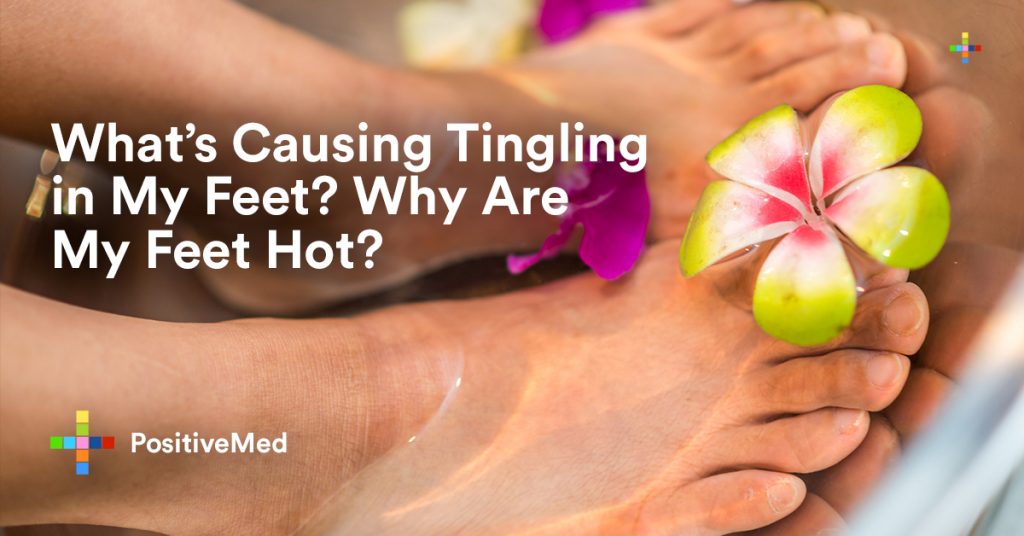Is it worth being worried if I have a tingling in my feet? At some point, you may have experience “needles and pins” in your feet. The feet might often become numb or painful.
There should be nothing to worry about. Tingling is normally caused by pressure on the nerves, especially when you stay in a single position for a long duration. The sensation often disappear when you move or shift positions.
Nevertheless, tingling in the feet can be continual. It is important to contact your doctor if tingling is persistent and painful. Your doctor can establish the cause.

Causes of Tingling in the Feet
Diabetic Neuropathy
Diabetes ranks among the top most causes of tingling in the feet. Diabetic neuropathy occurs when high blood sugar causes nerve damage. Diabetes symptoms include:
Intense thirst
Frequent urination
Itchy skin
Dry mouth
Fruity smelling breath
Lethargy or drowsiness
Yeast infections
Increased hunger
Weight loss
Numbness in feet and hands
Nausea and vomiting
Visual impairment
Slow healing of sores and cuts
Physical examination, medical history, and blood tests should be taken to determine if you have diabetes. Prescribed medications and lifestyle changes can help to manage diabetes.
Pregnancy
Tingling in the feet is very common in expectant mothers. As the fetus grows, it adds pressure on the nerves surrounding the womb and run down the legs. This can trigger “needles and pins.” Resting with your legs up, shifting positions, and ensuring you are well hydrated can help to relieve tingling.
Vitamin Deficiency
Deficiencies in some vitamins, especially B vitamins, can trigger tingling sensations in the feet. An underlying medical condition or poor diet can cause vitamin deficiency. Symptoms of Vitamin B12 deficiency include fatigue, chest pain, headache, dizziness, nausea, digestive problems, tingling in hands and feet, and enlarged liver. Treatments include supplementation, eating a well-balanced diet, and prescribed medication.
Kidney Problems
Tingling in the feet can occur if your kidney fails to function normally. There are many causes of kidney failure although the most common ones are high blood pressure and diabetes. Treatment include dialysis and kidney transplant.
Autoimmune Disease
This happens when your body starts attacking itself. Some of the autoimmune diseases that cause tingling in the feet include rheumatoid arthritis, lupus, celiac disease, Guillain-Barre syndrome, and Sjogren’s syndrome. Treatments depend on the cause with dietary changes and medications.
Infections
Inflammation of the nerves can be caused by a number of infections. This can trigger tingling of the feet. Examples of such infections include:
AIDS
HIV
Leprosy
Shingles
Lyme disease
Hepatitis B and C
Treatments depend on the cause of infection and may involve medications.
Certain Medications
There are some drugs that can cause tingling of the feet as a side effect. These include drugs used to treat cancer, HIV, AIDS, seizures, high blood pressure, and heart disease. Dosage adjustments or changing medication can help to relieve tingling of the feet.
Pinched Nerve
A pinched nerve in your back could be the reason behind tingling of your feet. Injury and swelling are the main cause of pinched nerves. Tingling may be accompanied by pain, sensational changes, and decreased range of motion. Treatments include rest, surgery, medication, and physical therapy.
Exposure to Toxins
Tingling in the feet can be triggered by exposure to toxins and chemicals. They include lead, mercury, alcohol, antifreeze, thallium, some herbal drugs, organic insecticides, and glue. Treatments include changing environment, medications, and safety measures.
Unknown Causes
You may experience tingling in your feet without a known cause (idiopathic). This usually happens to people over the age of 60. Tingling may be accompanied by pain, numbness, and difficulties while walking or standing. Treatments include medication, special footwear and safety measures.
What Causes Hot Feet
Hot feet refer to a hot or burning sensation in the feet. Causes include:
Pregnancy
Hot feet usually occur during pregnancy due to increased weight and hormonal changes that causes feet to swell and raises the body temperature respectively.
Menopause
Hot feet during menopause are common due to hormonal changes in the body.
Alcoholism
Excessive use of alcohol can impair your peripheral nerves and lead to a condition called alcoholic neuropathy. Alcohol interferes with certain nutrients that are necessary for optimal function of nerve cells.
Athlete’s Foot
This condition happens when the tinea fungus forms on the lower side of your feet. Athlete’s foot patient normally experience symptoms like burning, itching, and stinging in their feet.
Related Link: 4 Ways to Speed Your Recovery as an Injured Athlete
Vitamin Deficiency
Deficiencies in vitamin B6, B12, and folate impair nerve function. It can cause burning or hot feet.
Charcot-Marie-Tooth Disease
This is a peripheral nerve disorder that is genetic. It affects sensory nerve, causing a tingling or burning sensation in hands and feet.
Exposure to Toxins
Exposure to heavy metals like lead, mercury, or arsenic can cause a burning sensation in the feet and hands. These metals accumulate in the body and start to replace essential nutrients that are vital for optimal function of the nervous system.
Vasculitis
It is an inflammation of the blood vessels caused weakening of vein or scarring. It blocks the flow of blood to the lower body leading to hot feet.
Sarcoidosis
This refers to the inflammation of cells in various organs. You can develop hot feet if your nervous system is affected.
Chemotherapy
Chemotherapy involves an aggressive use of drugs to treat cancer. Since it destroys the rapidly growing cells, it can lead to nerve damage. Tingling and burning in the feet can occur if the nerves happen around these areas.
Other Causes of Hot Feet
Diabetic neuropathy
Uremia
Reflex sympathetic dystrophy
Erythromelalgia
Hypothyroidism
Chronic inflammatory demyelinating polyneuropathy
Tarsal tunnel syndrome
HIV and AIDS
Guillain-Barre syndrome
Treatment of Hot Feet
Treatment of hot feet depends on the underlying cause. Lifestyle changes, dietary adjustments, medications, and exercises may be recommended.








